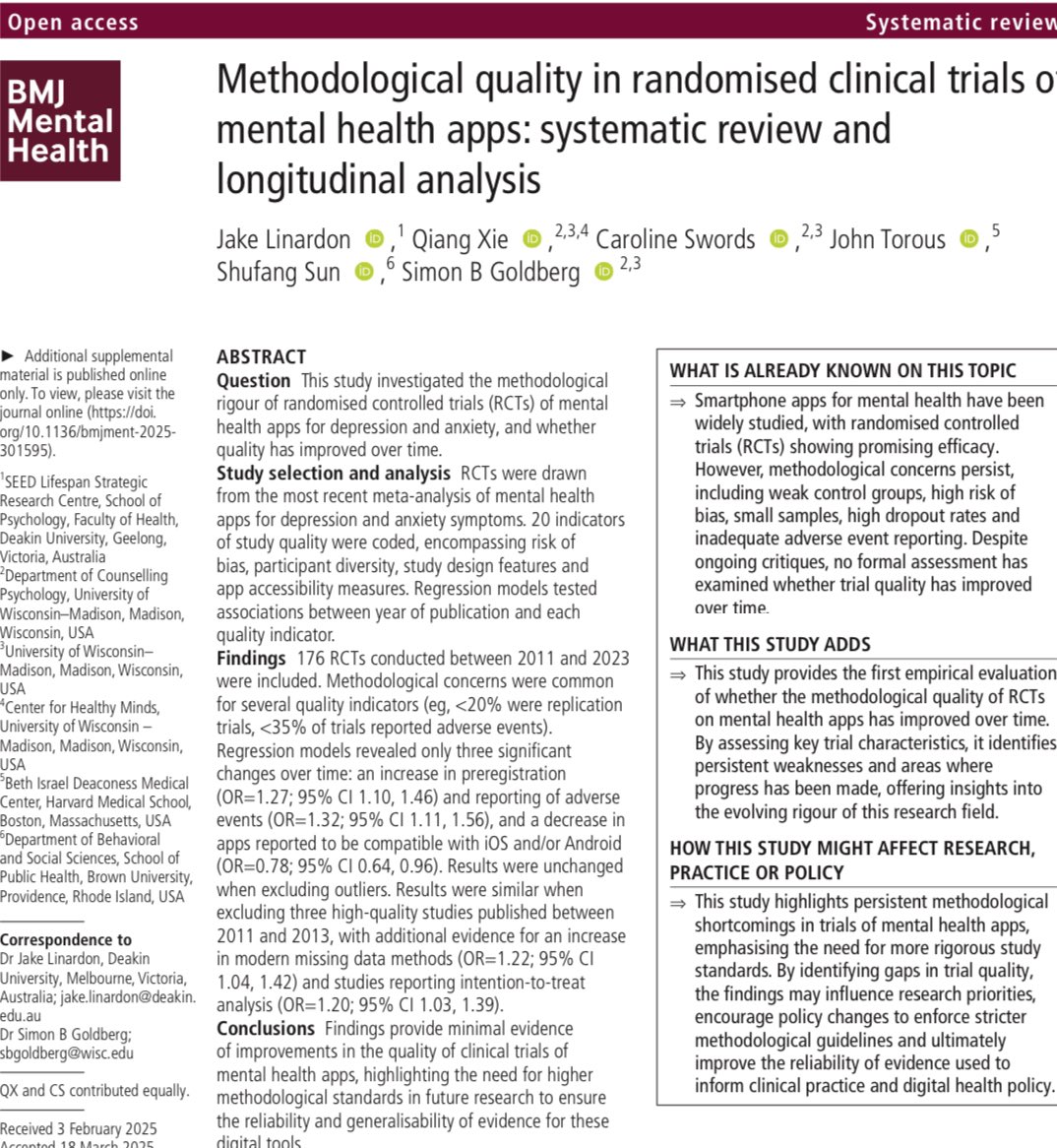Jake Linardon
@j_linardon
Senior Research Fellow @deakin interested in digital health, AI, and eating disorders
Machine-Learning Applications in Eating-Disorder-Outcome Prediction: A Systematic Scoping Review - Zoe McClure, Matthew Fuller-Tyszkiewicz, Mariel Messer, Jake Linardon, 2025 journals.sagepub.com/doi/10.1177/21…
What if we did not need so many specialized health apps? What if transdiagnostic apps that can help across many conditions worked just as well? New review led by @j_linardon has the answer-transdiagnostic as good as specialized apps! Free in @npjDigitalMed nature.com/articles/s4174…
Transdiagnostic-focused apps produce comparable effect sizes to disorder-specific apps — our new meta in @npjDigitalMed

Check out our new paper highlighting the potential and challenges of AI-powered smartphones for the monitoring and treatment of eating disorders — onlinelibrary.wiley.com/doi/epdf/10.10…
How can integrating artificial intelligence #AI and smartphone technology enhance personalized assessment and treatment for #EatingDisorders? In this new piece, published in International Journal of Eating Disorders, led by @j_linardon, we offer answers: onlinelibrary.wiley.com/doi/10.1002/ea…
New — efficacy of an intuitive eating online single session intervention for binge eating disorder onlinelibrary.wiley.com/doi/epdf/10.10…

Delighted to share 3 new articles, out today in World Psychiatry: 1 Latest Advances in Digital Mental Health onlinelibrary.wiley.com/doi/10.1002/wp… 2 Meta-Review of Physical Activity for MH onlinelibrary.wiley.com/doi/10.1002/wp… 3 Priorities & Opportunities for Lifestyle Psychiatry onlinelibrary.wiley.com/doi/10.1002/wp…
Our new review on the current landscape of digital psychiatry, including new evidence, issues, and challenges concerning these tools.
A lot has changed in digital mental health since our 2021 review. Our 2025 review is designed to catch you up on all things apps, VR, AI, chatbots, implementation, equity, and lived experience voices. Free in World Psychiatry: onlinelibrary.wiley.com/doi/10.1002/wp…
CBT appears to be an effective treatment for eating disorders regardless if it delivered in individual, group or self-help format.

Our new research using machine learning to predict clinical outcomes from a DBT app — sciencedirect.com/science/articl…

Cognitive behavior therapy (CBT) is generally effective for treating major depression, anxiety disorders, PTSD, OCD, and eating disorders. ja.ma/3RjRAne @emmamotrico @wvballegooijen
New evidence on the empirical status of self-help interventions for eating disorders — onlinelibrary.wiley.com/doi/epdf/10.10…

Has the quality of clinical trials of mental health apps improved over time? Not really, but we offer promising paths forward - mentalhealth.bmj.com/content/28/1/e… @SGoldbergPhD @JohnTorousMD @shufangsun

We’re conducting a study to assess researchers’ views of large language models to help with mental health research. If you’re a researcher in mental health, please do consider completing this 5-10 min anonymous survey to share your thoughts! researchsurveys.deakin.edu.au/jfe/form/SV_1N…
Mental health clinicians’ practices and perspectives of eating disorder apps sciencedirect.com/science/articl…

Navigating the Future of Psychiatry: A Review of Research on Opportunities, Applications, and Challenges of Artificial Intelligence link.springer.com/article/10.100…

I am editing a special issue for the international journal of eating disorders on AI. We are welcoming all submissions that explore the utility of AI in eating disorder treatment, practice and research. onlinelibrary.wiley.com/doi/10.1002/ea…

Our new review on the impact of patient choice on treatment outcomes. Giving patients autonomy to select their own treatment appears beneficial for depression, but less is known for other psychiatric illnesses. doi:10.1017/S0033291725000066
